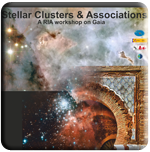Kinematics of Classical Cepheids in the Nuclear Stellar Disk
Matsunaga, Noriyuki; Fukue, Kei; Yamamoto, Ryo; Kobayashi, Naoto; Inno, Laura; Genovali, Katia; Bono, Giuseppe; Baba, Junichi; Fujii, Michiko S.; Kondo, Sohei; Ikeda, Yuji; Hamano, Satoshi; Nishiyama, Shogo; Nagata, Tetsuya; Aoki, Wako; Tsujimoto, Takuji
The Astrophysical Journal, Volume 799, Issue 1, article id. 46, 9 pp. (2015).
01/2015
ABSTRACT
Classical Cepheids are useful tracers of the Galactic young stellar population because their distances and ages can be determined from their period-luminosity and period-age relations. In addition, the radial velocities and chemical abundance of the Cepheids can be derived from spectroscopic observations, providing further insights into the structure and evolution of the Galaxy. Here, we report the radial velocities of classical Cepheids near the Galactic center, three of which were reported in 2011 and a fourth being reported for the first time. The velocities of these Cepheids suggest that the stars orbit within the nuclear stellar disk, a group of stars and interstellar matter occupying a region of ~200 pc around the center, although the three-dimensional velocities cannot be determined until the proper motions are known. According to our simulation, these four Cepheids formed within the nuclear stellar disk like younger stars and stellar clusters therein.


